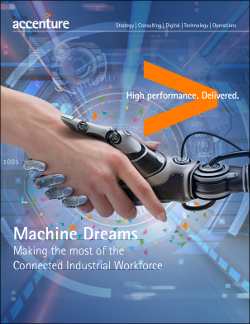Ungated Post | 17 Aug 2016
Machine Dreams: Making the most of the Connected Industrial Workforce

The digital revolution is transforming manufacturing. By bringing machines and artificial intelligence into the workforce, it is enabling an increasingly adaptable, change-ready, and responsive working environment: a Connected Industrial Workforce in which men and machines, working together, reinvent the production and service processes by which manufacturing outcomes are achieved.
We interviewed 512 respondents across all major industrial countries in North America, Western Europe and Asia. Our sample included factory directors, engineering and R&D heads, operations and HR managers, as well as C-suite executives. More than half were from the industrial equipment industry, with the rest split between automotive and construction equipment. All respondents were involved in setting their company’s strategy for the Connected Industrial Workforce. The interviews were conducted in December 2015.
Oxford Economics’ team is expert at applying advanced economic tools that provide valuable insights into today’s most pressing business, financial, and policy issues.
To find out more about our capabilities, contact:
Americas
Diantha Redd
+1 (646) 503 3052
Email
Asia Pacific
Peter Suomi
+65 6850 0110
Email
EMEA
Aoife Pearson
+44 (0)203 910 8054
Email
Related Services

Post
The economic impact of abandoning the WTO
Oxford Economics have been commissioned by the International Chamber of Commerce (ICC) to provide an independent assessment of the economic impact of WTO dissolution. This report details our findings and the assumptions underpinning our analysis.
Find Out More
Post
The economic impact of the sports activities of public service media
This study shows how the sports activities of public service media supported €4.5 billion of GDP and 57,000 jobs across 31 European countries in 2022. The report also highlights wider economic benefits of public service media sports coverage, such as the way in which it leverages sponsorship income for sports bodies.
Find Out More
Post
Global Trade Education: The role of private philanthropy
Global trade can amplify economic development and poverty alleviation. Capable leaders are required to put in place enabling conditions for trade, but currently these skills are underprovided in developing countries. For philanthropists, investing in trade leadership talent through graduate-level scholarships is an opportunity to make meaningful contributions that can multiply and sustain global economic development.
Find Out More